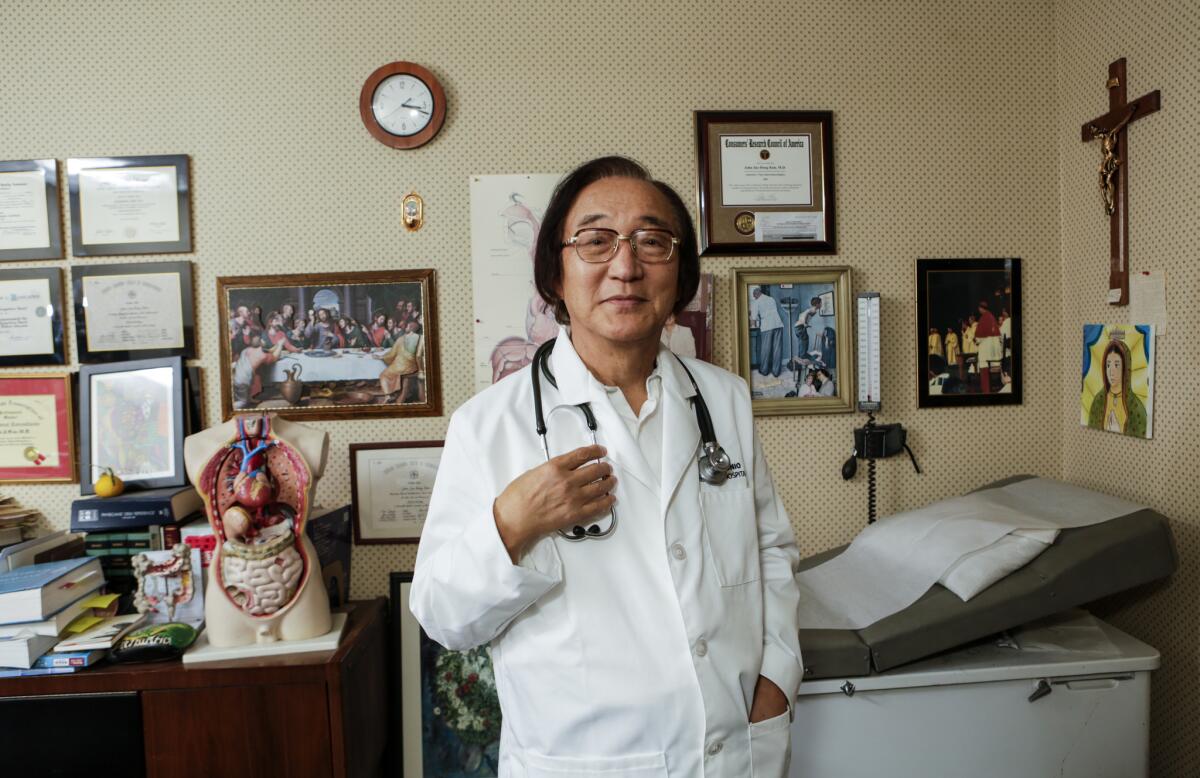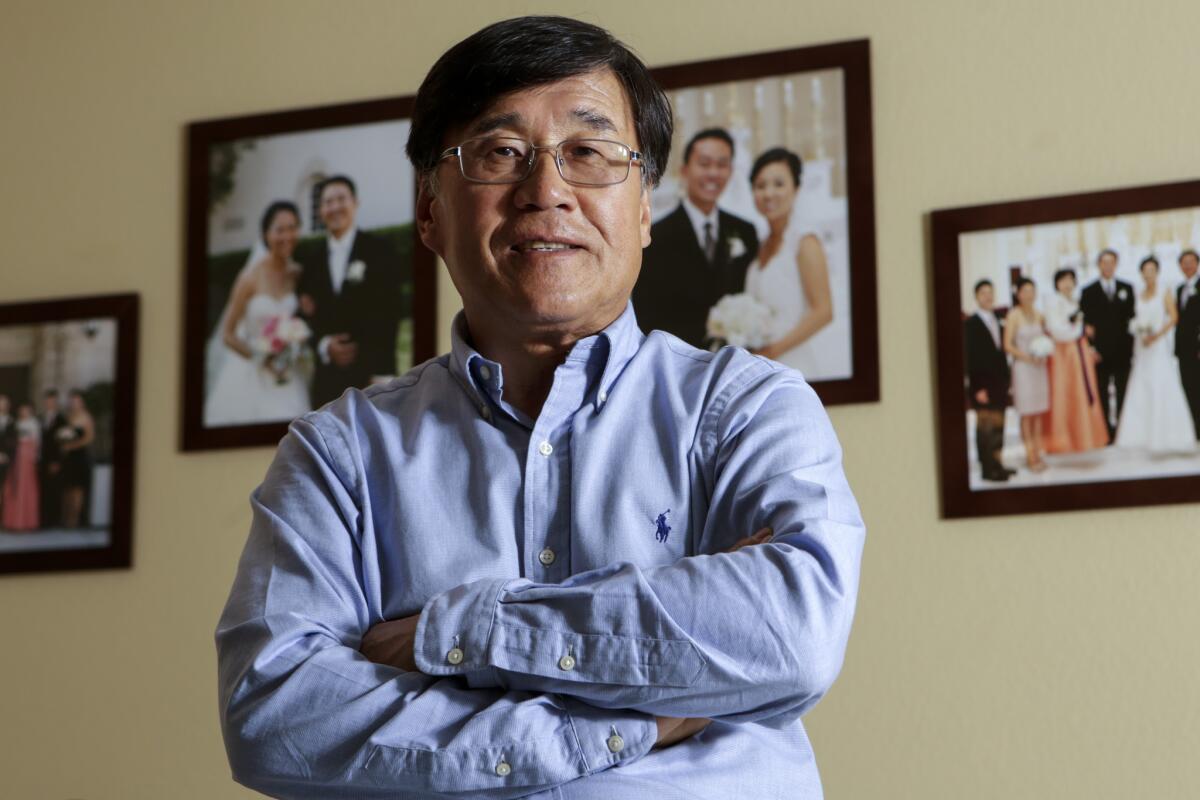In the age of Tinder and eHarmony, Koreatown parents take their children’s love lives into their own hands

Dr. John Jae-dong Kim at his clinic in Upland. Kim is a Catholic deacon and gastroenterologist who is one of the organizers behind a Koreatown matchmaking event for parents with unmarried children.
- Share via
Bachelor No. 647, a willowy lab tech in a blue polo shirt and thick glasses, squirmed as his eyes darted from one corner of the low-ceilinged hotel ballroom to the other.
Standing to his right, his mother told those gathered that her now-30-year-old had weighed 14 pounds at birth. He’s responsible and industrious, she said, juggling graduate studies and work. His hobbies include fishing, hiking and reading.
“He has everything ready. He owns a home,” she said in Korean before handing the microphone to her son.
He apologized for his poor Korean and switched to English. “I don’t know. I guess I’m looking for a nice girl who’s outgoing, and that’s it,” he said.
In the audience, Korean parents filling nine tables each hunched over a list, pens and highlighters in hand, with the seriousness of bidders eyeing a prized work of art. Some scribbled notes; some circled entry No. 647, which read: “Son — 30 years old.” A hushed sense of purpose and the cloying scent of air freshener hung in the room.
Wearing color-coded and numbered name tags — red for daughters, blue for sons — the parents were there to tackle what one organizer called the biggest social issue facing the Korean immigrant community: Young men and women are too busy with their lives and careers to start a family.
“Seek, and ye shall find,” Simon Jung, the night’s emcee, told the crowd, citing Matthew 7:7. “Do you want a good son-in-law? Then you have to seek, you have to find.”
Seek, and ye shall find. Do you want a good son-in-law? Then you have to seek, you have to find.
— Simon Jung, emcee
::
Young people in the U.S. are choosing to marry later and later, many satisfied with dating well into their late 30s and 40s or living with a significant other without tying the knot. That has been a source of much heartburn for first-generation Korean immigrants, for whom getting their children settled in wedlock is the culmination of their obligation as parents.
Jae-dong Kim, a gastroenterologist and Catholic deacon, came up with the idea for an event connecting parents with unmarried children six years ago, while marrying off the last of his four offspring.
He saw many fellow Koreans who were stressed out about their kids’ marital prospects but powerless to do much about it. A handful of professional marriage consultants were charging exorbitant fees, sometimes in the thousands of dollars, for introductions.
“I realized it was a grave social issue our immigrant society needs to address,” he said.
In April 2010, Kim, Jung and others from their church started Chungsil Hongsil, so named for the blue and red thread used in traditional Korean marital rites to symbolize the union between a husband and wife.
They invited Koreans of all religions and professions and charged a fee to cover the costs of renting the space and serving dinner.
The result is a cross between a business pitch meeting, speed dating and bingo night.
Each parent, and in a few cases the children themselves, gives a two-minute introduction, laying out the bachelor’s or bachelorette’s age, profession, education, hobbies, religion, Korean proficiency and anything else that might be of interest.
In their day back in Korea, it was typical for parents to arrange set-up dates for marriage prospects. And in the age of Tinder and eHarmony, these Korean American parents are taking matters into their own hands.
::
Late on a Sunday afternoon earlier this month, the parents arrived at the Oxford Palace Hotel in Koreatown, some from as far as Oregon and Canada, each clutching a photo of a son, a daughter or both.
The event organizers assigned each a number between 629 and 677, picking up from where the numbers left off at the last gathering.
They mingled awkwardly over a buffet dinner, warily feeling out one another as they waited for the main event to begin. A few repeat attendees, who hadn’t found a successful match in previous meetings or had returned to offer up a different offspring, greeted the organizers.
At one corner table, three sets of parents and a father compared their children’s “specs,” as Koreans refer to factors such as education and profession. They exchanged flattery over photos of one another’s children.
“They’re so busy studying and getting their degrees. It’s all about timing,” lamented the husband of couple No. 670.
“The smarter ones have a harder time at it,” chimed in father No. 659, wearing two name tags because he was presenting both his son and his daughter.
Jung kicked off the night by urging parents to be proactive and to make sure to remember the numbers of the young men or women who piqued their interest. He then turned over the floor to the parents themselves.
Mother No. 632, a petite woman dressed smartly in a houndstooth jacket, spoke of how she was losing sleep over her unmarried son and daughter, ages 38 and 37.
Her daughter, a freelance writer who likes to read and do yoga, is “looking for someone with a clear soul — and she says it’s OK if his looks are just average,” she said. Her son, a straight-laced biomedical engineer who doesn’t touch alcohol or cigarettes, would like to meet a woman who is pretty and calm.
Father No. 635, a balding man with a booming voice, said it was his third time at the gathering. He was looking for potential mates for his two sons, 41 and 39, both dentists like him. He had gone as far as taking out an ad in the local Koreatown paper in search of daughters-in-law, thus far to no avail.
“They’re tall, and much better-looking than their father,” he said, to laughs. “But they seem to have high standards.”
Bachelor No. 644, wearing an ill-fitting suit and tie, his hair neatly combed, was the first of the night to have shown up in person with his mother.
The 37-year-old stood smiling sheepishly, slouching with his hands folded in front of him, as his mother introduced him as a loving and understanding bioengineer with two older sisters. He likes to sing, and he finished the San Diego Marathon, she said.
“Isn’t it convenient when the goods show up themselves like this?” Jung said. “Let’s give him a round of applause.”
::

At the very first meeting six years ago, Patrick C. Park showed up to help out as a volunteer. But as he was listening to the presentations, he was particularly impressed by one bachelor. This young man, he thought, would be great for his daughter, so he asked for his contact information.
His daughter, having been raised in the U.S., balked at the idea, skeptical of and embarrassed by the parental matchmaking. She eventually agreed to give the man a chance, Park recalled. In November, she gave birth to their first son.
Park and his wife have volunteered for every event since then — 16 of them so far.
“It’s giving an opportunity for good people who want to create beautiful families to meet each other,” he said.
The organizers don’t keep track of successful matches, leaving everything but the initial introduction to the young men and women themselves. But they say they’ve heard of many happy couples whose parents thank them profusely. One pair is getting hitched next month.
Among those at this month’s event who were hoping to become another success story were a mother looking for matches for her fraternal twins — a brother and sister — and a mother who told the story of how she and her son, then 6, came to the U.S. with just a suitcase after suffering “heartache” in Korea.
Parent after parent described how in their eyes, each of their children was precious and nearly perfect — and would make someone very happy.
“I would like for it to be someone who’s rich,” said father No. 671, who has a 34-year-old daughter. “Not in money, but in heart. Someone who can cry with her, laugh with her.”
See more of our top stories on Facebook >>
::
After all the introductions, Kim gave the parents some pointers.
Exchange photographs first before starting a conversation, he told them. Whipping out photos mid-interaction can lead to awkward moments if you don’t like what you see.
Don’t be discouraged if a parent of someone you’re interested in is talking to somebody else — think of your children’s future and swallow your pride.
Kim also advised parents to lie to their kids. Tell them a nice family acquaintance wants to set you up, he said, as the younger generation may be mortified by the idea of this type of event.
Some parents milled about, reluctant to make the first move. Others eagerly flitted from table to table, collecting phone numbers or email addresses.
One mother in a lavender fur-cuff coat and bright red lipstick searched frantically: “Are you 661? Where’s 661?”
Amid the chaos, at a table in the back of the room, a bachelor and a bachelorette were deep in conversation. His face was flushed; she sheepishly buried part of her face in her palms.
About 9 p.m., the parents filtered out, some in pairs eagerly chatting about what a great match their children would make.
Kim’s wife bid farewell to father No. 635, the dentist with two sons who’s been to the event several times.
“I hope I don’t see you again,” she said as he walked out triumphantly, several phone numbers tucked in the pocket of his leather jacket.
Twitter: @vicjkim
ALSO
To maximize speed-dating success, uncross those arms and take up space
‘Ktown Cowboys’ is a clumsy, misguided tour of Koreatown
Koreatown, with its $1.6-million chandeliers, is about to get some affordable housing units
More to Read
Sign up for Essential California
The most important California stories and recommendations in your inbox every morning.
You may occasionally receive promotional content from the Los Angeles Times.











